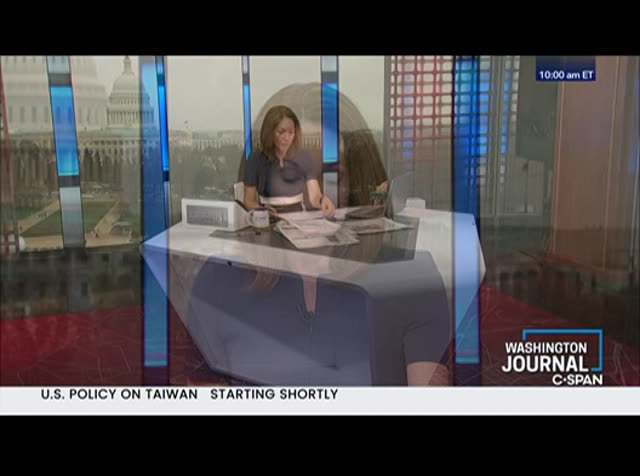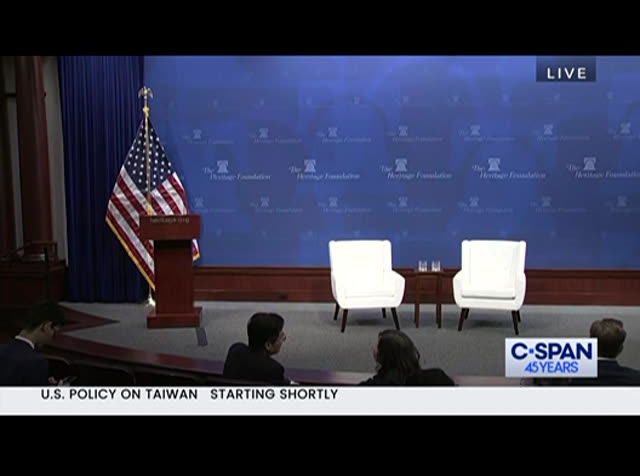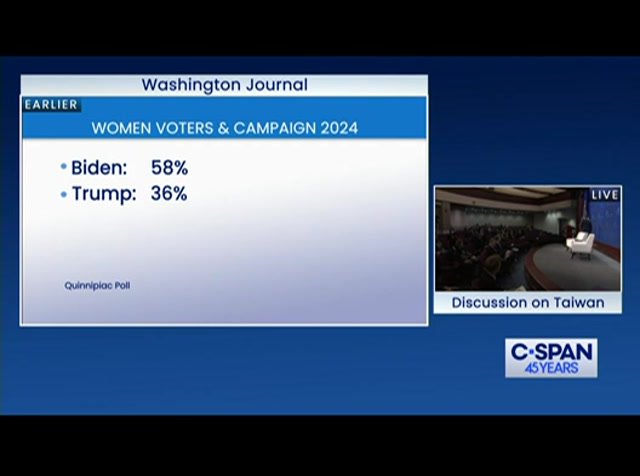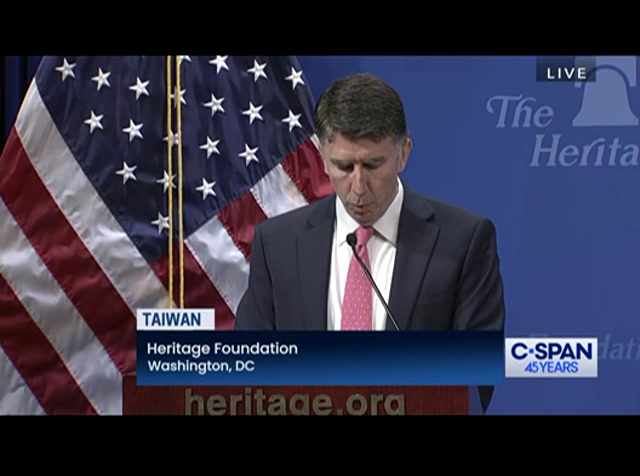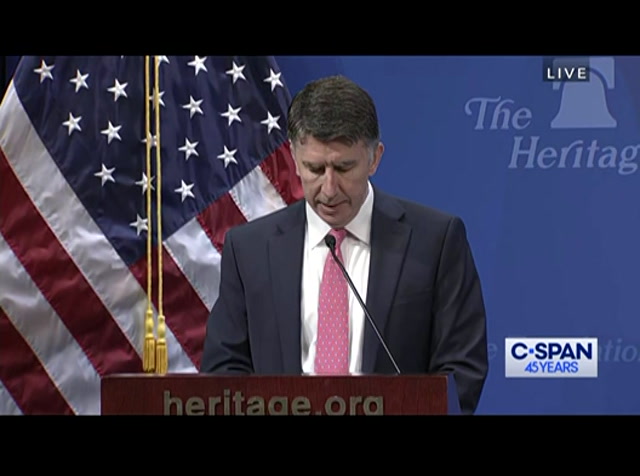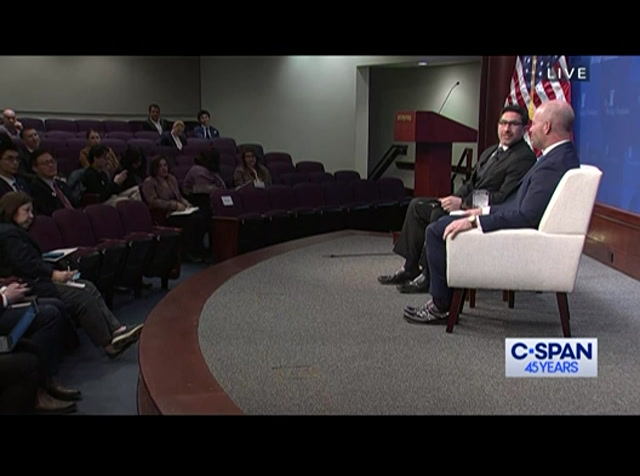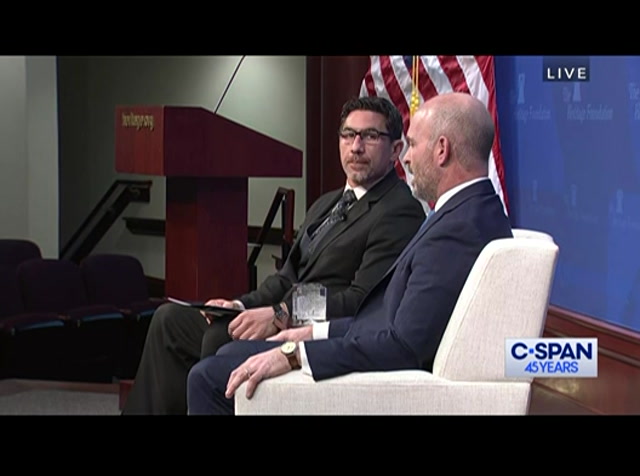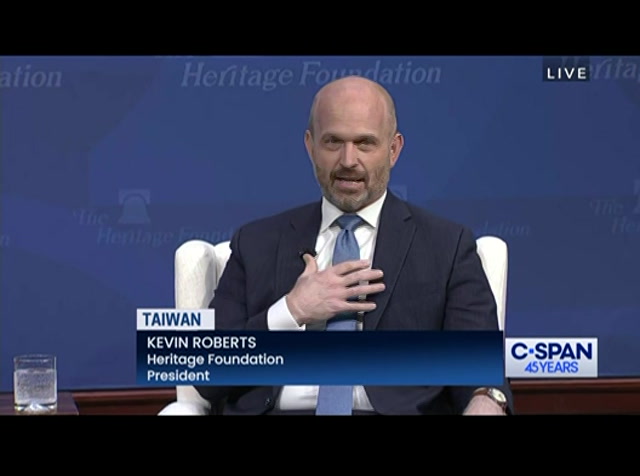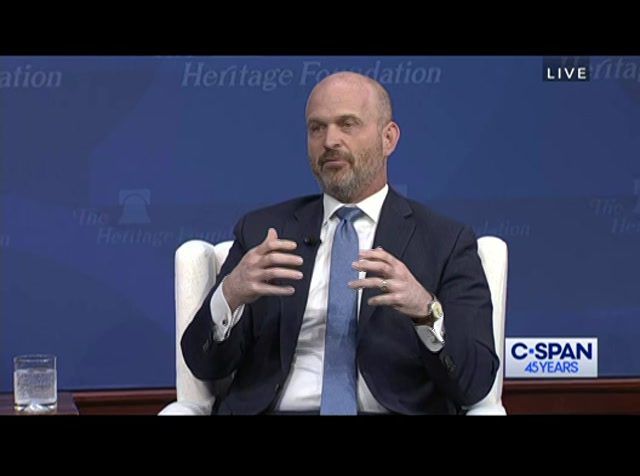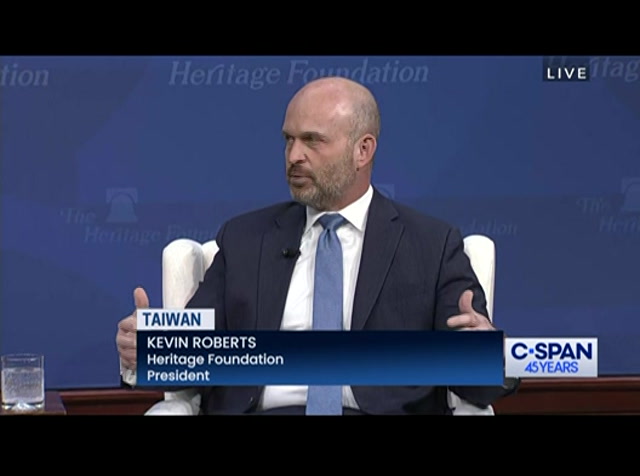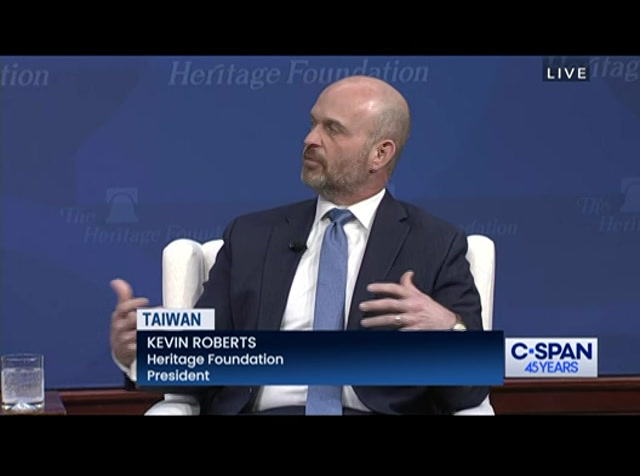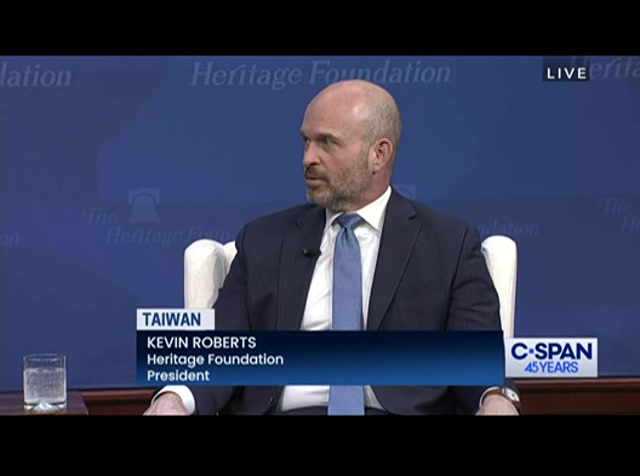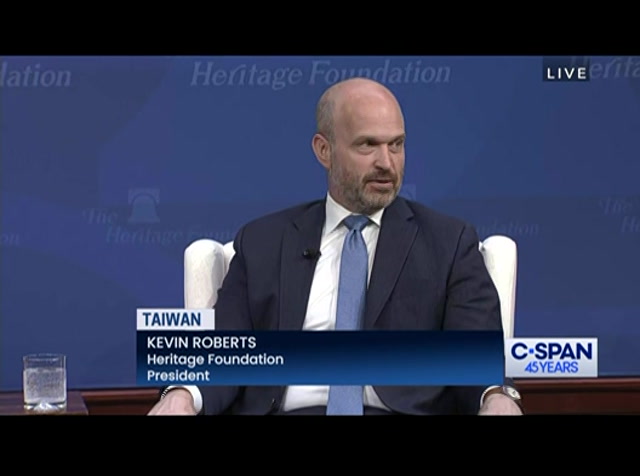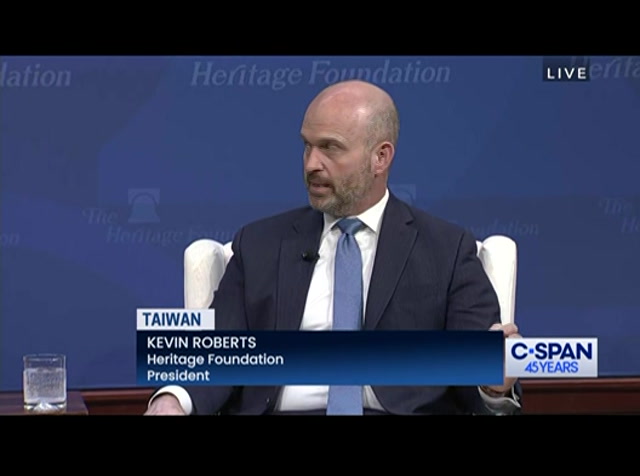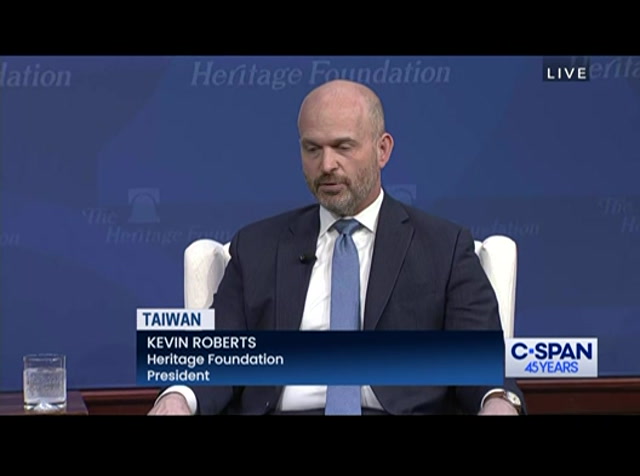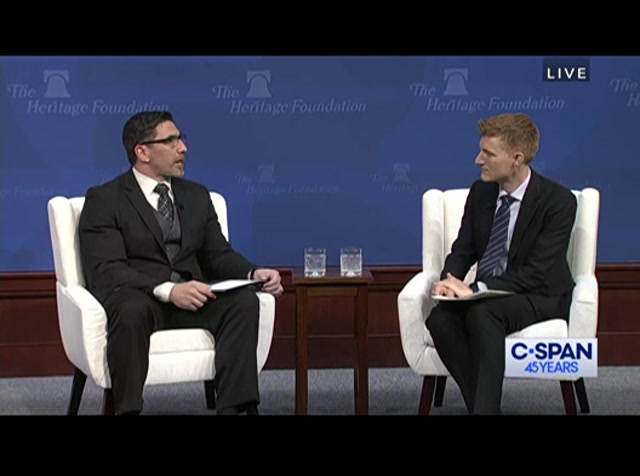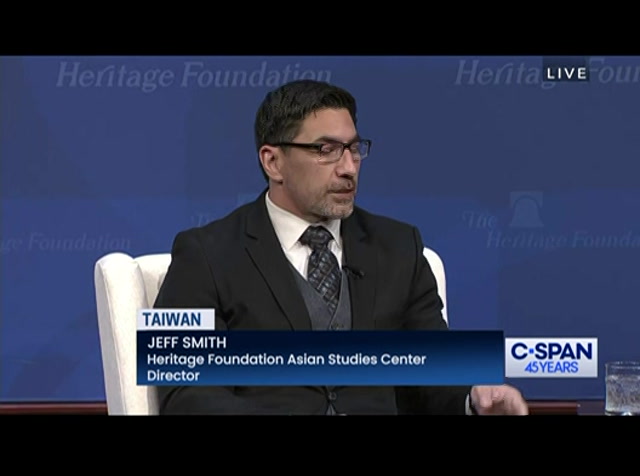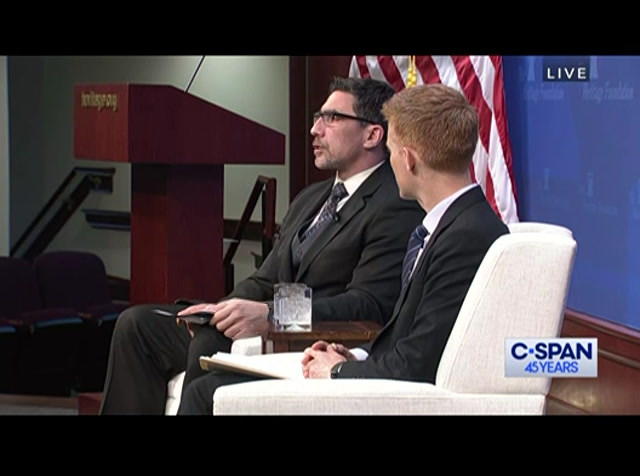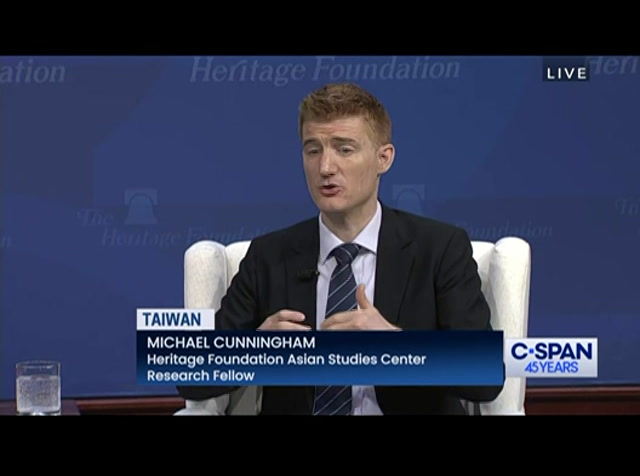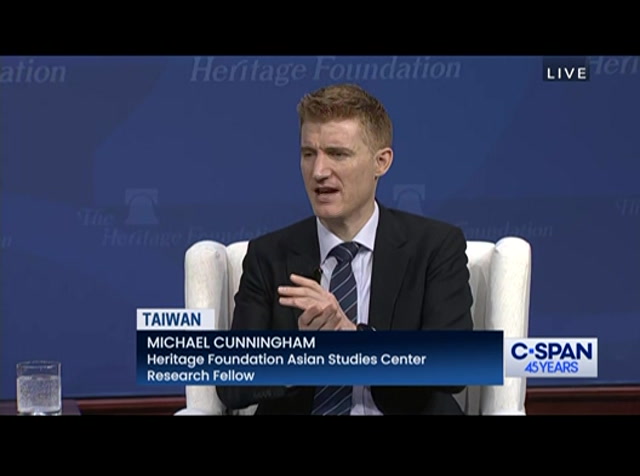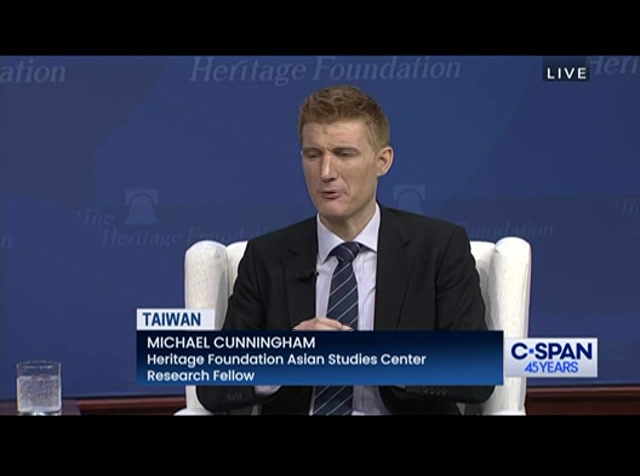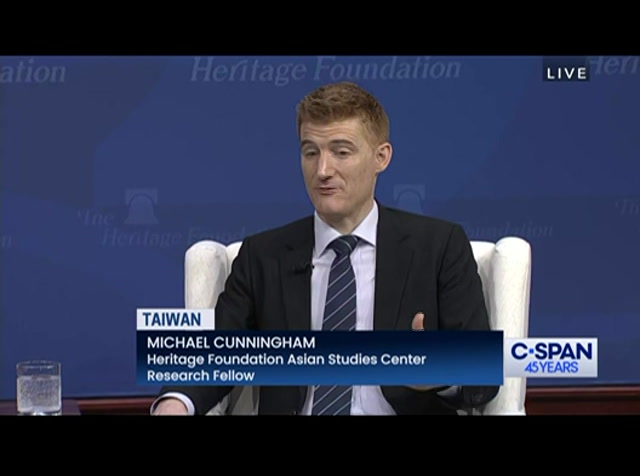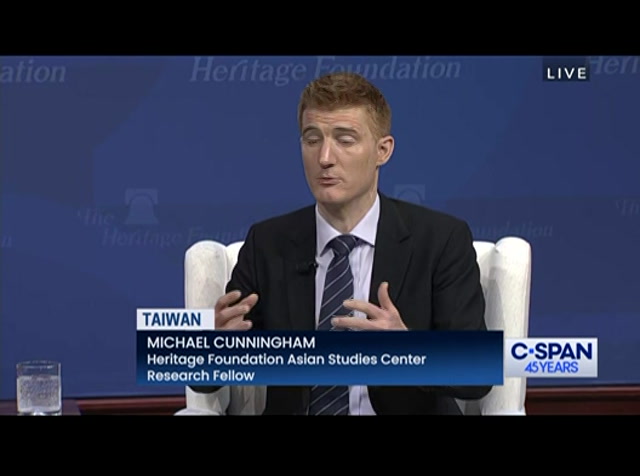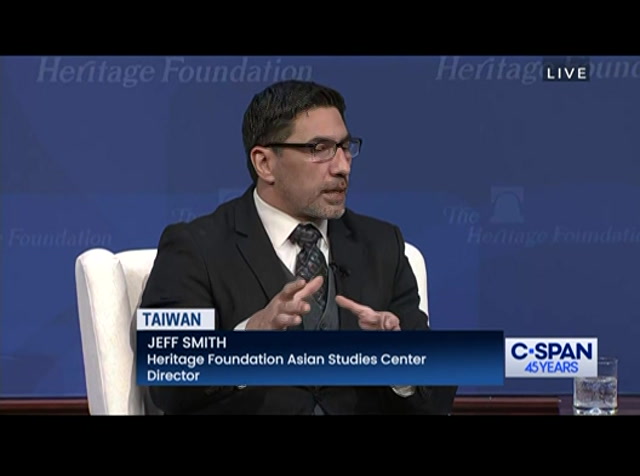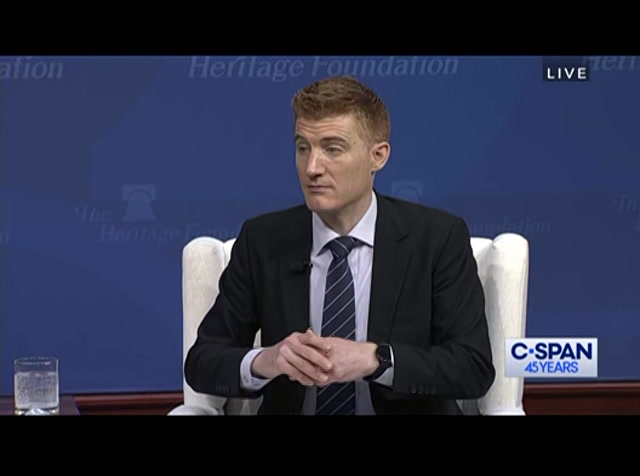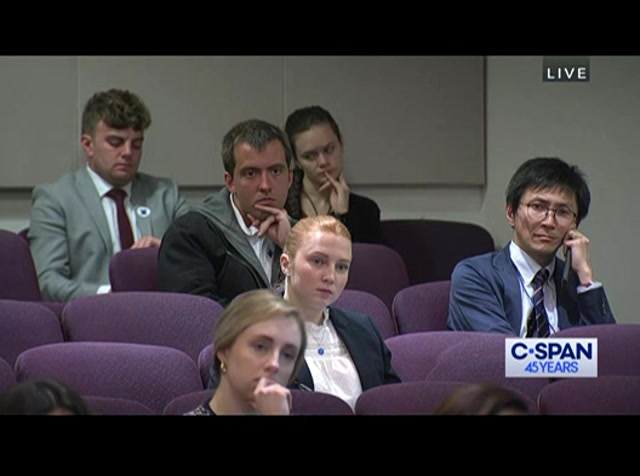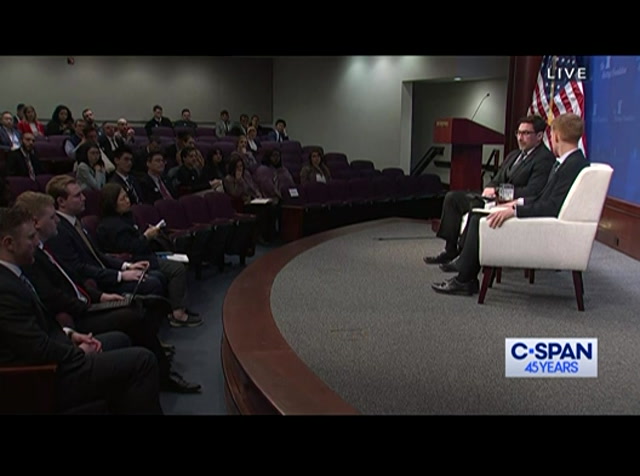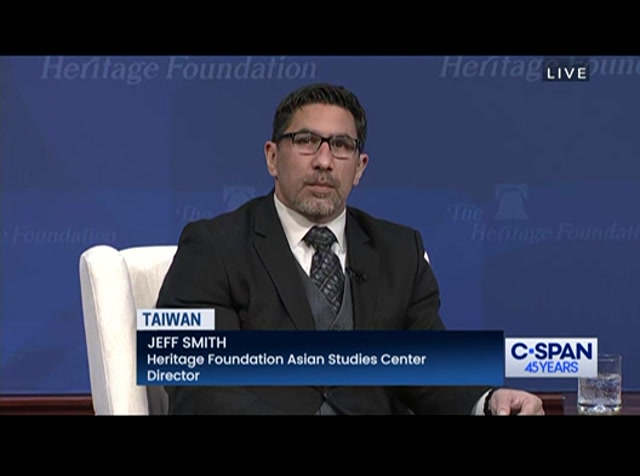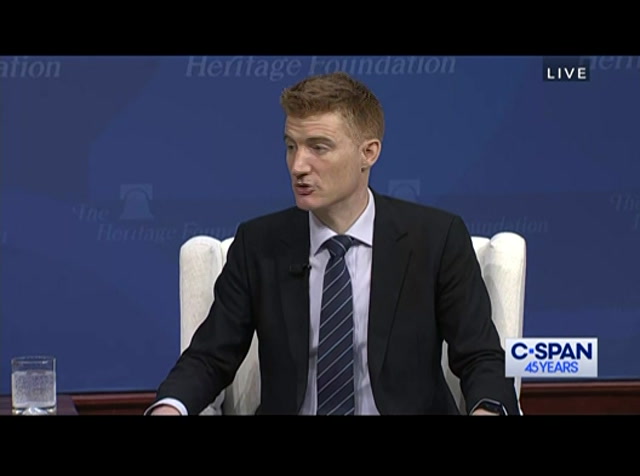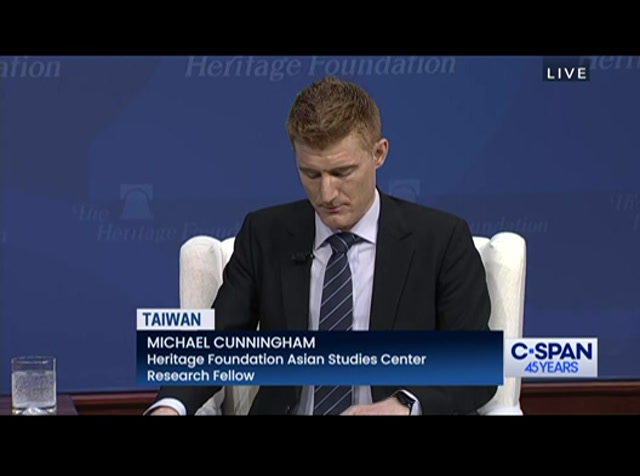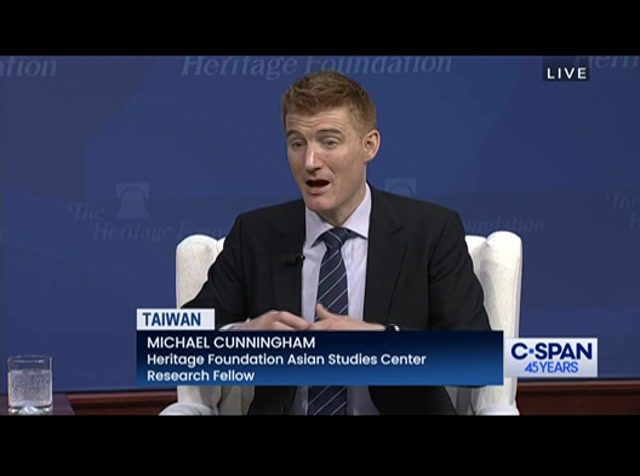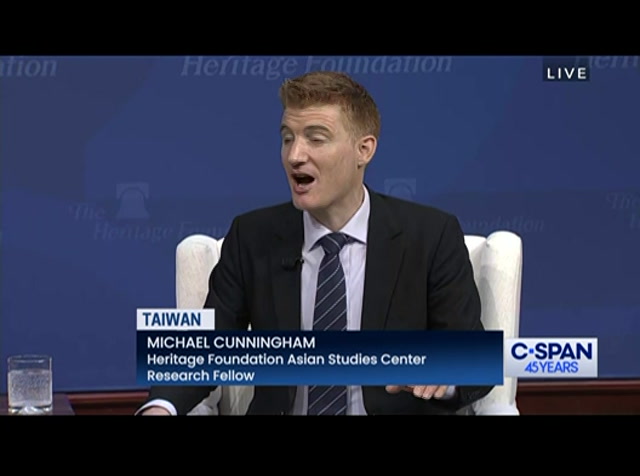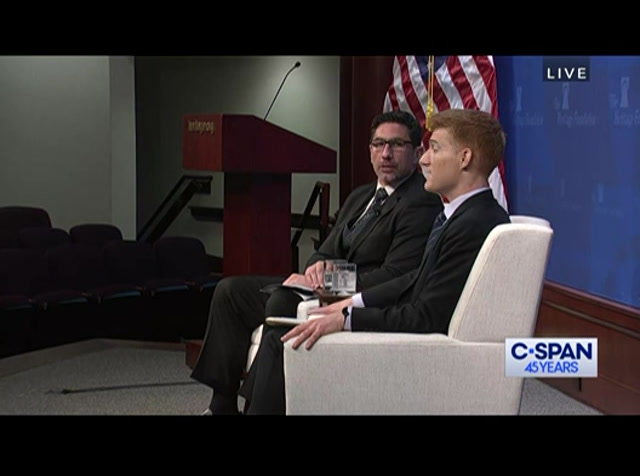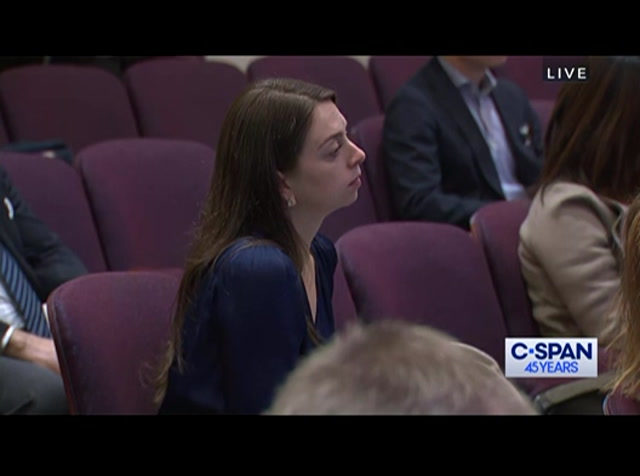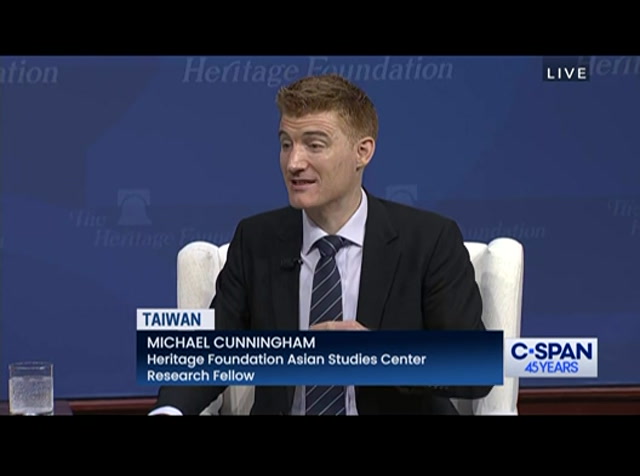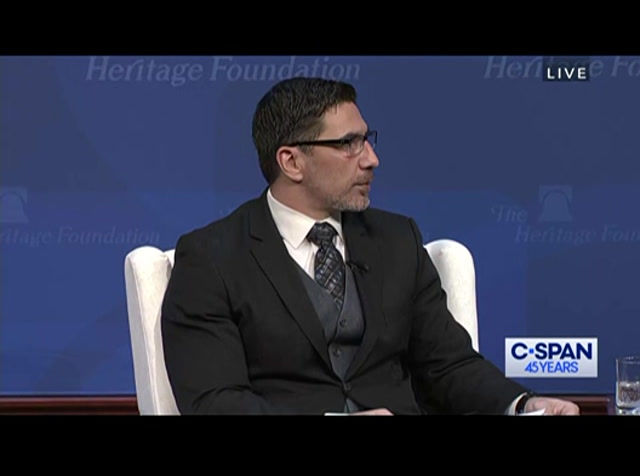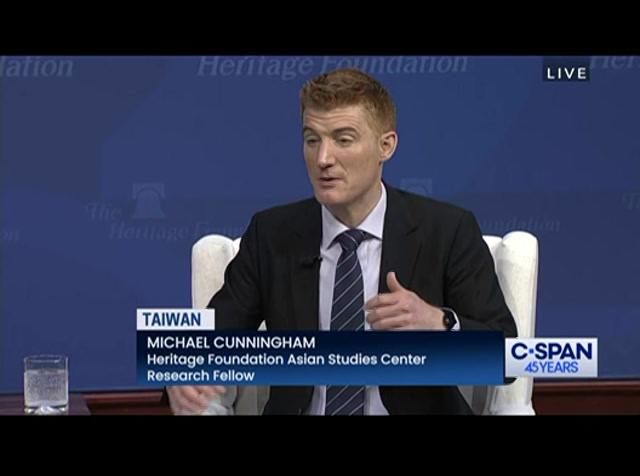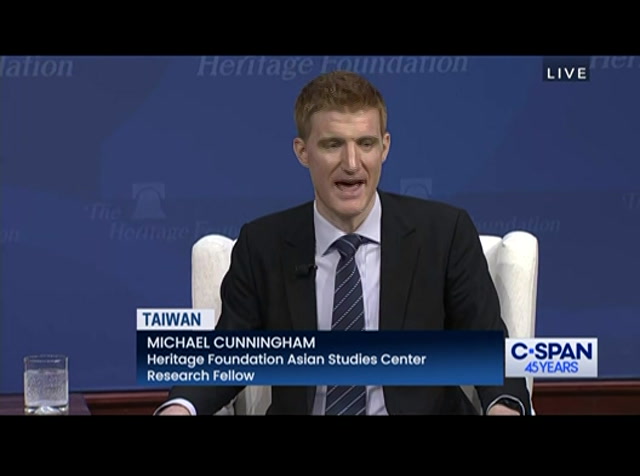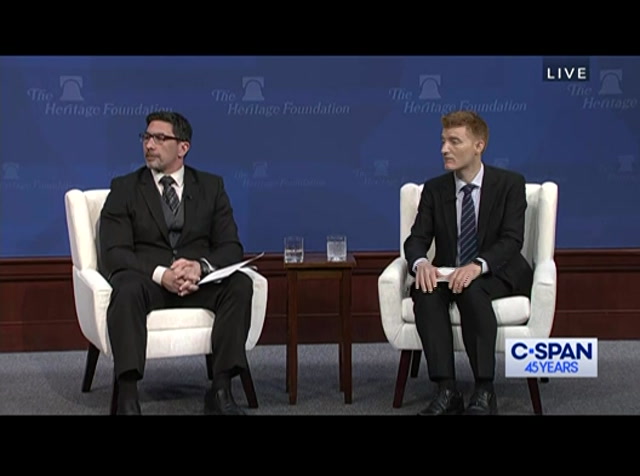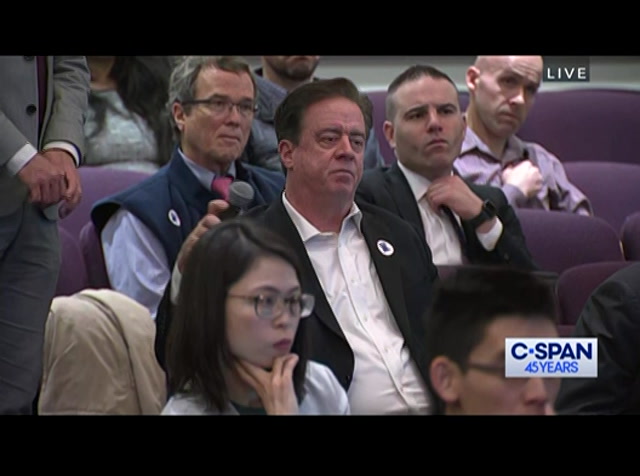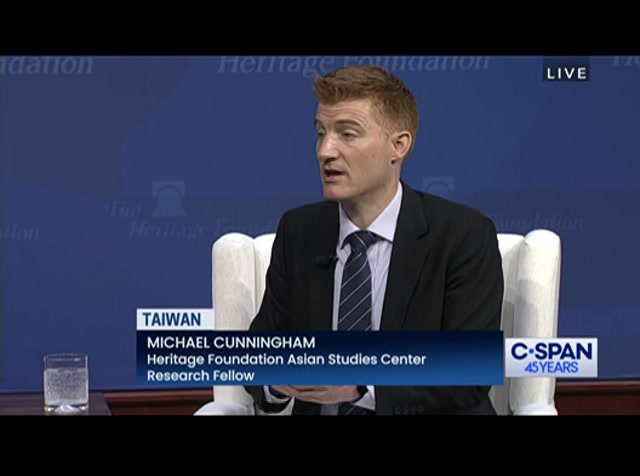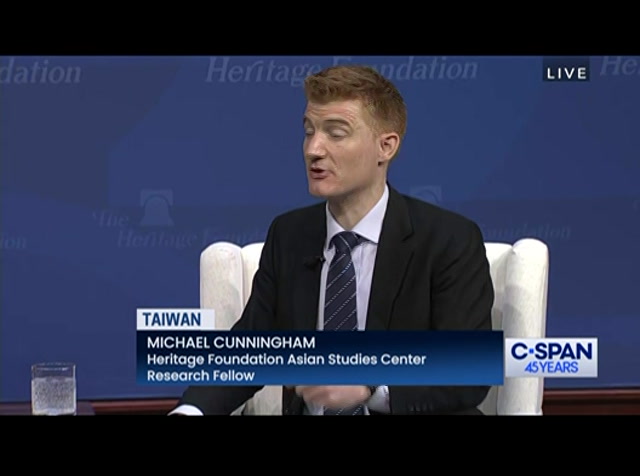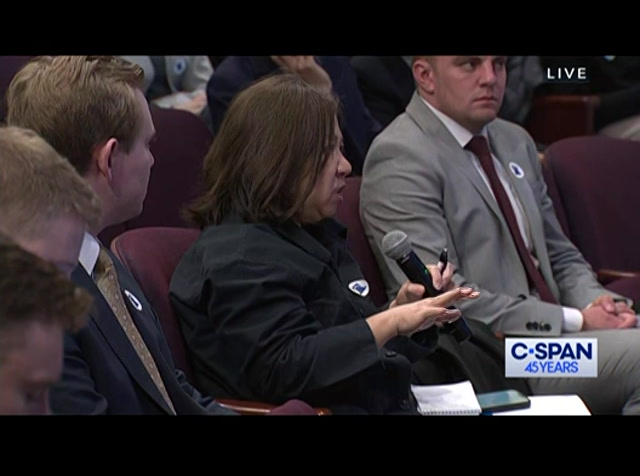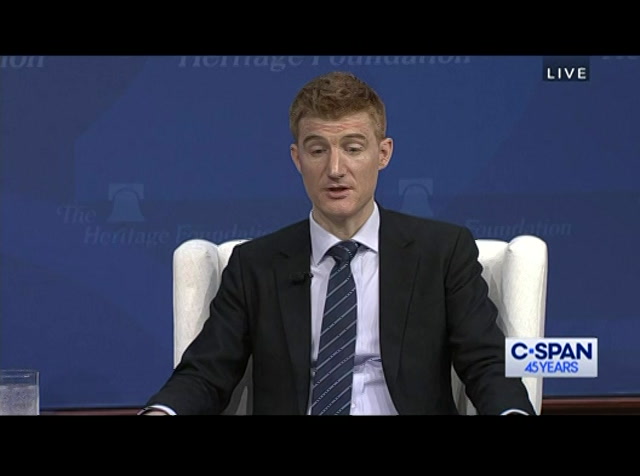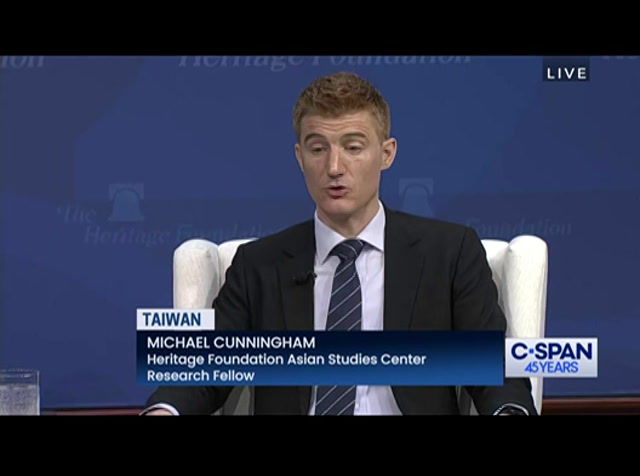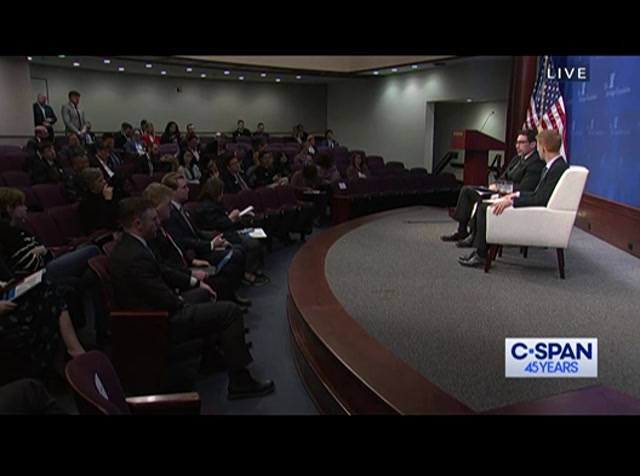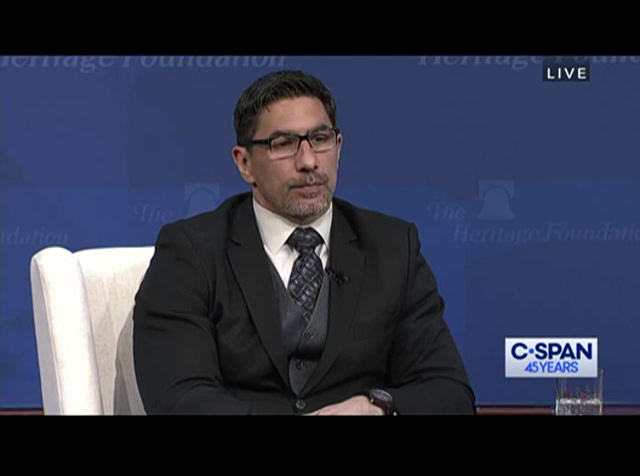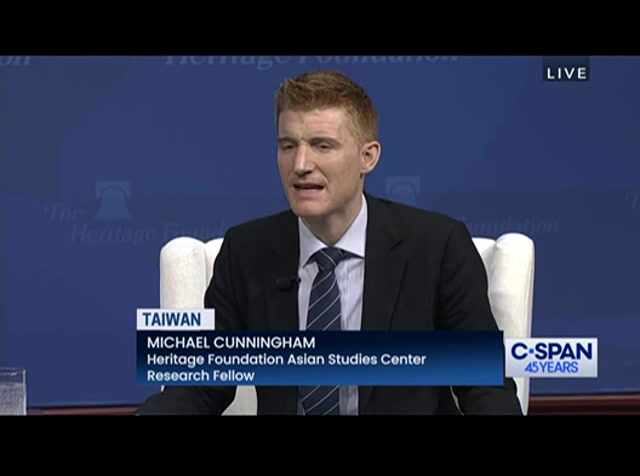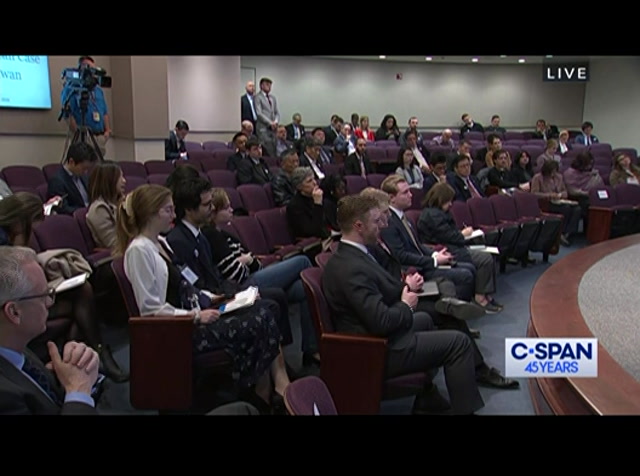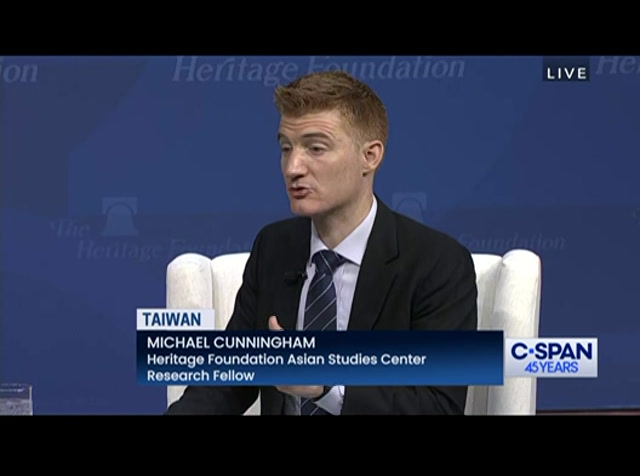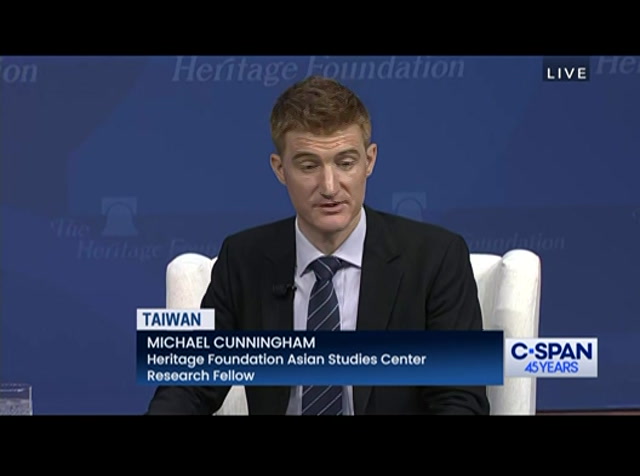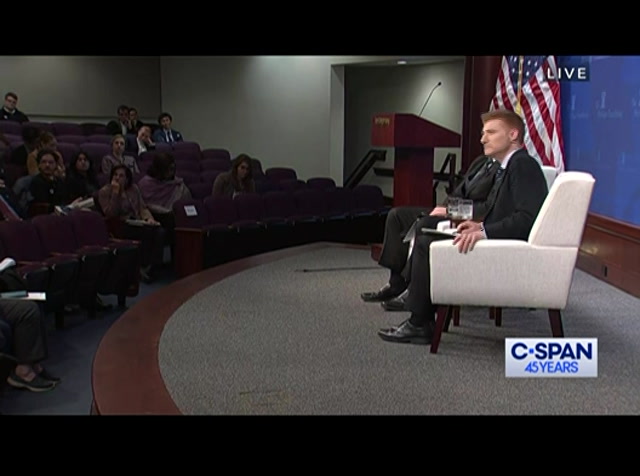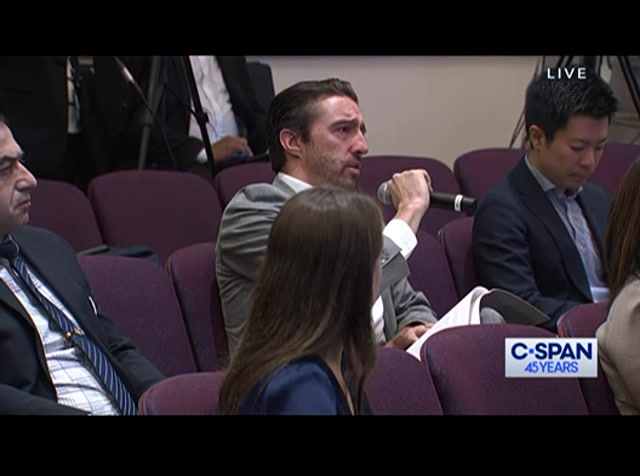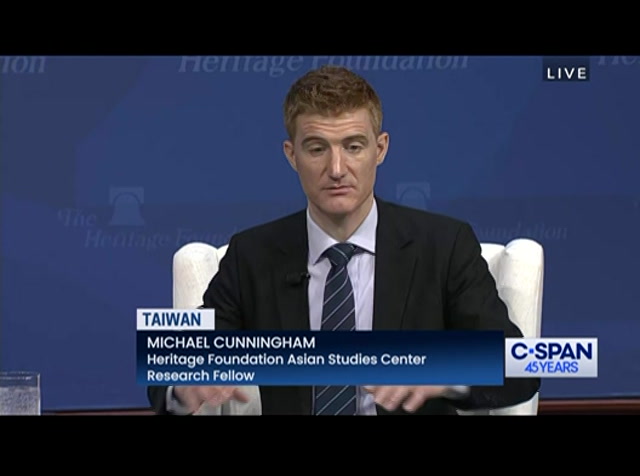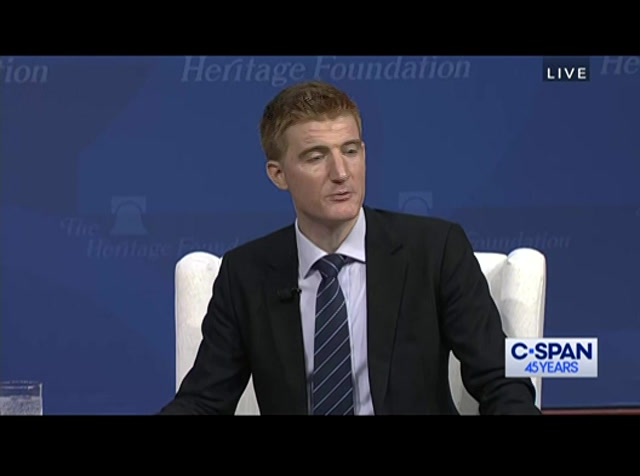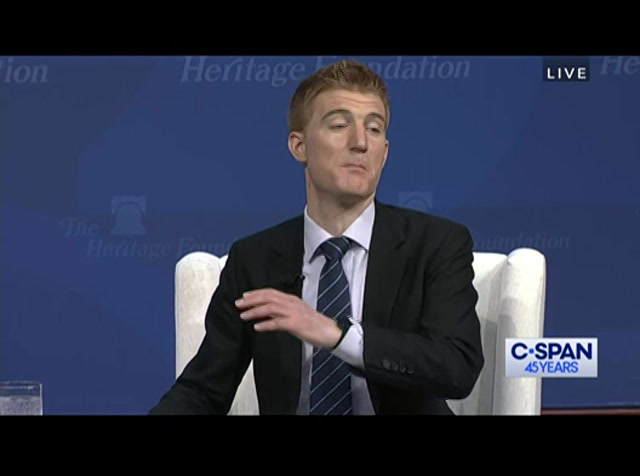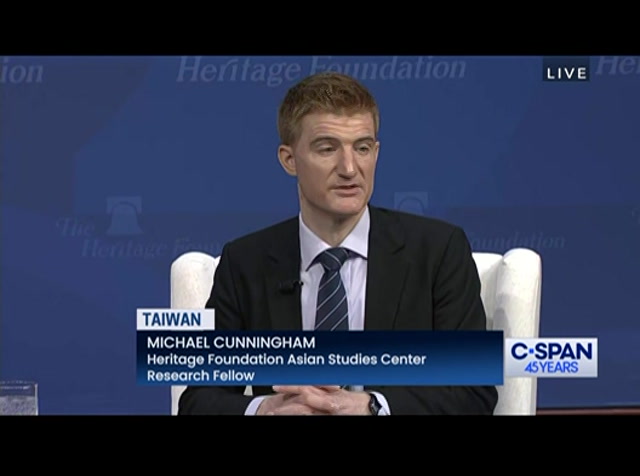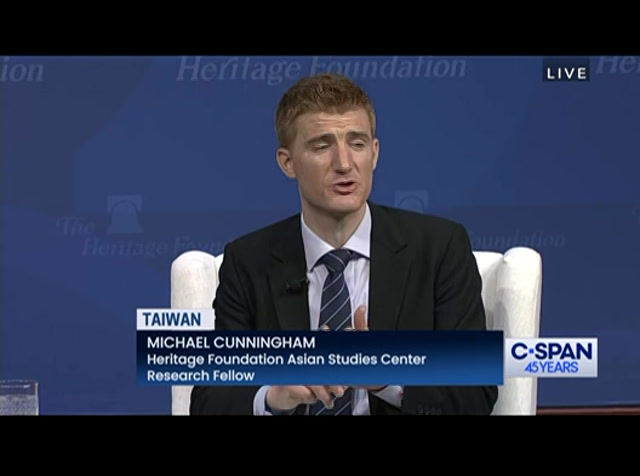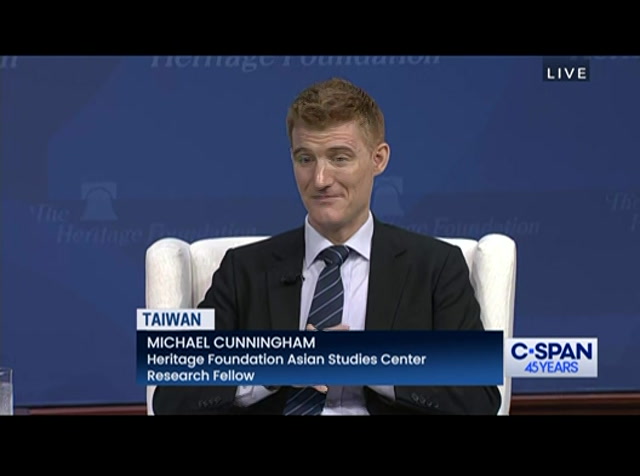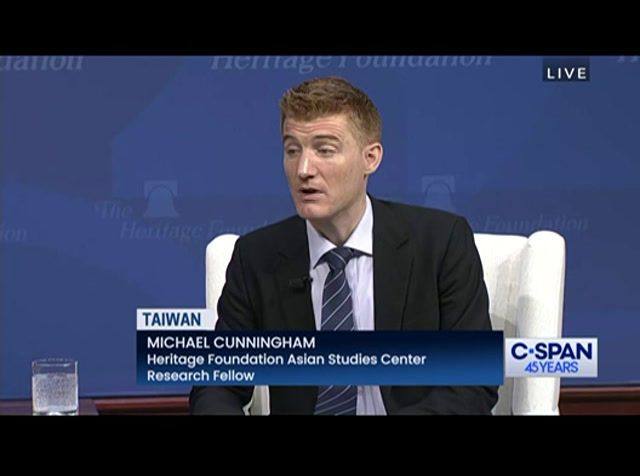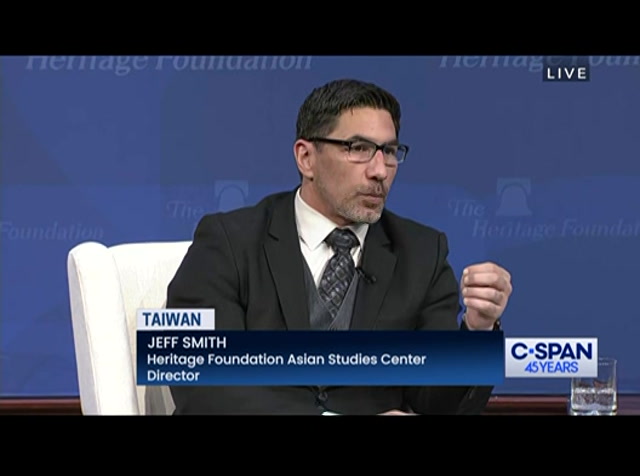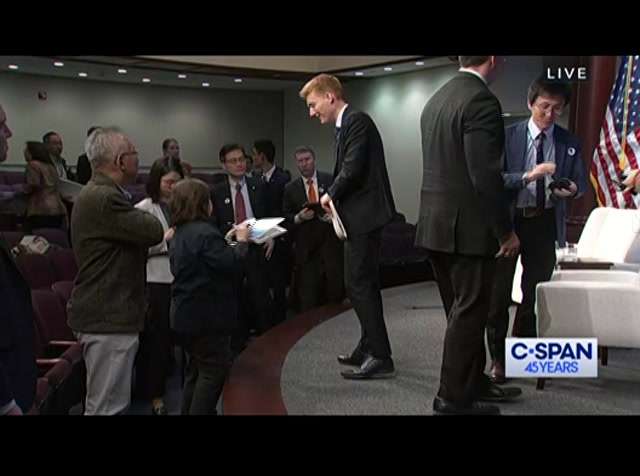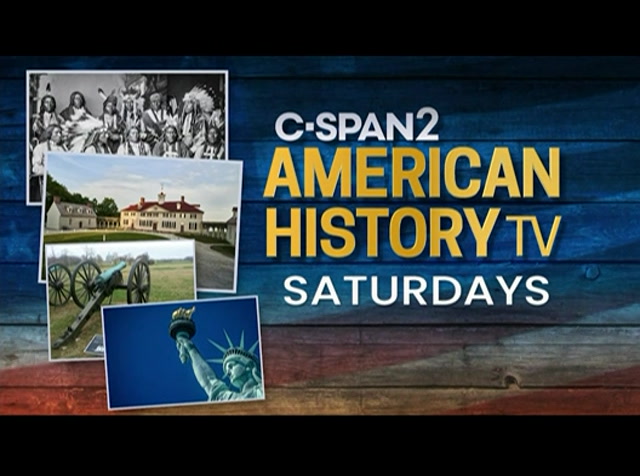tv Fmr. Trump Adviser Discusses U.S. Policy on Taiwan CSPAN March 28, 2024 10:01am-11:04am EDT
10:01 am
heritage foundation holding any event on taiwan, a conversation on how supporting taiwan security benefits america. let coverage here on c-span, c-span now, and online at c-span.org. [captioning performed by the national captioning institute, which is responsible for its caption content and accuracy. visit ncicap.org] [captions copyright national cable satellite corp. 2024]
10:02 am
>> good morning and welcome to the heritage foundation, those of you in person and our online audience and those watching on c-span. we are glad to host this event today. heritage is made confronting the chinese comet's party a top priority. the american people have recognized according to several recent polls that the chinese communist party is the top adversary of the united states. in the past two administrations, they've agreed the number one
10:03 am
threat to america. perhaps the most critical part of confronting the chinese comet's party is to deter it from to attacking taiwan. the incidence of chinese military activity around taiwan has skyrocketed in recent years, leading many experts in washington to conclude that china could attempt to seize the island in the coming years. taiwan by contrast is a vibrant democracy that just conducted another free and competitive election. it is a top 10 trading partner with the united states and one experts calculated trade with taiwan supports 200,000 jobs here in the united states. if china attempt to invade taiwan or captures the facilities that produce over 90% of the worlds advanced semiconductors, then the impact on the u.s. and the world economy would be grave, indeed. that could lead to what could be many of trillions of dollars of damages. china would have nearly total control of the taiwan straight
10:04 am
where half the worlds container ships and 90% of the world's largest container ships transit every year. a new paper by heritage scholar michael cunningham makes the case to strengthen deterrence of such an invasion and provide taiwan the weapons and supplies it needs to secure it self. and defend itself. today we will hear from michael but first we will your from the heritage president kevin roberts about his recent trip to taiwan where he and michael and others met with taiwan's and incoming presidents. taiwan has a flourishing democracy and ranks fourth in heritage his own index of economic freedom. conducting an interview is the heritage director of the asian studies center jeff smith. jeff and several colleagues wrote the major work winning the new cold war come a plan for countering china that was released exactly one year ago today. please welcome to the stage, dr. kevin roberts and jeff smith. [applause]
10:05 am
jeff: good morning, thanks to everyone in attendance and everyone watching at home and in beijing and friends around the world especially beijing. we have a great program today. and a special guest to kick off the discussion, dr. roberts, thank you for joining us this morning. kevin: always good to be with you. jeff: dr. roberts came to the heritage foundation over a year ago promising to make china a priority and he has followed through on the pledge. i've seen him become personally invested in some of our struggles and our efforts to make better legislation on china make better policy on china and pushback against the ccp. he also wrote a fantastic commentary last october titled
10:06 am
we are in a new cold war, it's time our politicians started acting like it. i would encourage all to read that, it's one of the better things i've read in china in quite some time. despite the considerable demands on your schedule, you took a trip to taiwan and japan in late february and early march. we have a few minutes here with you today where i hoped you could share some observations on what compelled you to take this trip? kevin: first of all, i was happy to go and was looking forward to doing that. in descending order priorities and these are all important reasons to go, the first and most important is because it is in america's own interest. it is in every individual americans vital interests for us to know taiwan firsthand as a friend and an ally. given the privilege that i have of leading this great institution and working with real experts like you and
10:07 am
michael who we will hear from in a minute, it was good to go firsthand. the second is looking at it from the perspective of the taiwanese, it's important that people across the world know taiwan -- know the plight of taiwan. the plight is very positive in many respects, economically, socially culturally, taiwanese people are wonderful and beautiful and warm and as an adopted texan, taiwan is the texas of asia. that's the highest compliment that texas can give. you see my texas flag i wear every day until we close the border. the third thing is, from the standpoint of the united states, there are only three or four countries whom if they were attacked would directly affect how our lives go the very next day. at the top of the list, great britain, unconscionable that
10:08 am
they would somehow be attacked but imagine a world that if that were to happen, how that would change the united states. secondly as israel and that's happening. the third would be japan. we appreciate that but not as much as we should. japan and her japanese friends and i mean this with great sincerity, we should see japan is the great britain for us of asia. fourthly, although not necessarily for them list is taiwan. for us at heritage, it's vital to be able to tell that story to american policymakers who, to their credit, across the political aisle, there are many democrats who deserve as much credit for recognizing this as republicans do. diff we have to understand that defending taiwan diplomatically is in the vital interest of the united states. kevin: jeff: well said. jeff: i know you have a jampacked schedule.
10:09 am
in both countries, you met the outgoing president and the incoming president and you met a range of senior officials, defense officials, economic officials, what were some of the bigger takeaways from your meeting? kevin: top of mind for me as an historian, i paid attention to culture, people, what people are saying on the sidewalk and the hotel and so on. it's such a cheerful and vibrant place. that is the main reason i call it the texas of asia. it's also a great economic engine, a great place for entrepreneurial efforts and as it relates to some of the official meetings if you will, members of the government, the incoming president, the outgoing president. the wonderful combination of resolve for the benefit of the taiwanese people and also the savvy and artfulness of how to navigate that. because at heritage, we do
10:10 am
something with the study of not just diplomacy but that barely scratches the surface. it's statecraft. there are a few states in this world, a few countries that are excellent at statecraft. taiwan is one of them. the united states can learn a lot from them but the third thing would be, and this is entirely from us, no one in taiwan would ask us to say this on their behalf it we couldn't and wouldn't if they had. this is coming from our own analysis. we have to do better in the united states, particularly the congress although it's done a pretty good job of delivering what we promised whether that be munitions or whether it be diplomatic decisions and that is both a republican and democratic opportunity and challenge. jeff: well said. since returning from taiwan, i have heard you use the word
10:11 am
indispensable to describe taiwan and its sensuality to u.s. security and economic interests. i don't recall you using that word prior to the trip. jeff: kevin: the value of seeing firsthand what the world would be like, what the united states would be like if god for bid taiwan were invaded. again, with my parochial hat on as an american which of course is totally appropriate, people from certain countries places a top priority the needs of their nation. if taiwan were invaded america would be a poor place. america would be a less safe place. but also, there would be a chain reaction during the first cold war, we are in the second with china, we operated with the thesis of a domino effect.
10:12 am
that was real. the soviet union initiated that. make no mistake, the chinese saber rattling toward taiwan is born out of the same saber rattling they do to us in the united states and if i may be really blunt, taiwan is indispensable is something like that scenario were to happen but it's also indispensable that hopefully that doesn't happen and causes us in the united states to realize that the number one enemy of the world in the history of this great country, the united states, is the chinese communist party. as awful as the soviet union was guys as awful as nancy germany was, as much as we dislike the united kingdom in the 1700s, the chinese comet's is the greatest threat to this country and free people ever in the history of this country. taiwan helps us remember that. what's at stake if something happens. kevin: very well said.
10:13 am
you also spent some time in tokyo while you were in asian i wonder if you had any observations to share with the group about your time in japan. kevin: equally wonderful, my first time in japan instruct by the beaut of a culture and the wonderful people. although i knew the following, i didn't know it as clearly as i do now. that is the strength of the japanese-u.s. alliance is as important as the strength of the u.s.-united kingdom alliance. in fact, the growing friendship, the growing formal alliance of those countries is important not only for the people who live in each of those places but it's extraordinarily important for taiwan in particular. the biden administration deserves some credit for continuing that friendship. we think it should be even more robust and expanded and whether president biden wins a second
10:14 am
term or president trump wins a second term, you can count on the heritage foundation to be not just advising but encouraging vehemently the continuation of that. we ought to be as americans, extremely grateful for the courage that the japanese have taken in mustering more money for defense for reasons we understand it's a difficult political situation for them but they are doing it and happy about it and i should say that i left tokyo to come back to virginia optimistic. i think we will actually avert war because in the near term, we in the united states although it's been very late in the game, have come to realize what's at stake finally. kevin: it's nice to end on an optimistic note. i think you are needed elsewhere but dr. roberts, thank you for spending time with us this morning. kevin: thank you all. [applause]
10:15 am
jeff: michael, thanks for taking some time to talk about your paper with us this morning. you are very well known at heritage but you are an unknown commodity to summon the audience. i thought maybe we could begin the conversation by you sharing a little bit about your background and how you came to heritage and where you were before. michael: thank you, i actually took a different path i guess to the think tank world and most people. i worked in the private sector. i was a political risk analyst based in china. i actually lived in china during two different times and in between that, i spent time living in taiwan where i learned quite a bit about the situation
10:16 am
there. it's from the perspective of businesses. i was an advisor for businesses there. i guess it was a unique perspective in the think tank world but one that really changed how i view taiwan and mainland china as well. jeff: that experience has been invaluable to your time here. you have done a lot of great writing over the last year and a half since i've been working with you as the director but this paper in particular i think was a of your best work. one of the great benefits of the paper is that it takes a narrative about taiwan, things we generally understand taiwan is important to american security, taiwan is important to global economics and as the fundamental foundational research to support those
10:17 am
claims. you sort of dive deeper into things that we tend to sort of brush over narratively. one of the important points you make is that this is about more than a struggle between an existential struggle between democracies and autocracies. that's part of it and we do like democracies and we don't like it when they are bullied by autocracies. it's about much more than that. it's about tangible interests, it's about the security of everyday americans and the prosperity of everyday americans. maybe we can start this discussion getting right into the thick of it why does taiwan matter to the security of an average american? michael: thank you for that. it's true, these things are maybe self-evident to those of us who spend our lives researching them and to the military strategists who are in
10:18 am
charge of keeping america safe. it's not always self-evident to the american people and even the politicians who represent them. basically, in one word, it's geography. to really take this down and put the bottom line up front, it's that we do not want a war with china. that would be disastrous. while there are some people reasonably who fear that maybe by continuing to back taiwan and support them, we may be accidentally pulling ourselves into a potential war with china. it's actually the opposite is more likely to be true. just to walk everyone through the logic really quickly, taiwan
10:19 am
, it is physically located in one of the most strategic locations on earth as dr. roberts had said. the taiwan strait is extremely important for commercial shipping. the luzon strait is one of the most strategic military waterways out there. taiwan occupies a critical mode in the first island chain. it's a chain of islands between japan and maritime southeast asia that, to be blunt, we have china boxed in close to it. we have the people's liberation army pretty much close to its own borders. it does operate outside of that location but its operations are much curtailed because they cannot just operate at will. if china were able to take taiwan and control the island
10:20 am
and the waterways around that island, it would be able to break through the first island chain. it would be able to make a play for a strategic breakout into the pacific. if that happens, think about it, it's a bipartisan agreement in the united states that the chinese comet's party is the greatest external threat to our country. do we want to give them that kind of strategic advantage? right now, we have a huge advantage over them. can i guarantee that disaster would strike? i cannot but it would be possible and to add onto that, china has been very clear that it wants to dominate asia. it wants regional hegemony, regional domination. by definition, it would have to push the u.s. military out of
10:21 am
asia in order to do that. if it had taiwan, it would be able to start pursuing that goal in earnest. taiwan is essential if it wants to ever have a regional domination. i would remind maybe for the first long time of our existence as a country, that wasn't critical to american national security but it is now. we learned that in world war ii and we learned it with pearl harbor. we do not want an adversary to even be able to make a play for regional dominance. i'm not saying that china would try to plow over asia with its military. what i'm saying is that it would be working very hard to make it extremely risky, extremely costly, extremely difficult for the u.s. military presence to
10:22 am
remain in the indo pacific. and we have pacific territory, we have guam, for example, it's a very important -- we have a lot of military assets there so important military bases. we have hawaii, we have ultimately the continental united states which, if china managed to get regional dominance and that would still be very difficult, it would be more likely to result in war before it got to that point, which would be a disaster, but if it did ever get to that, our country would be at more direct danger. kevin: that's a very comprehensive answer. jeff: there's an additional component to the security question you didn't touch on witches u.s. allies in the region. in particular, the philippines
10:23 am
and japan. those come to mind for two reasons, one because we have treaty obligations and is quite likely many military persons believe there would be involvement in the conflict over taiwan but also because we have tens of thousands of americans living in those countries. if they were to be dragged into a conflict or struck preemptively which is by the -- which is a possibility, you would have american casualties at the outset of a conflict. the addition of our alliances so near to taiwan complicates matters even further, doesn't it? michael: absolutely. japan and the philippines are right next door to taiwan. japan actually has in highland that's closer to the main island of taiwan than mainland china is.
10:24 am
to both japan and the philippines, a chinese takeover of taiwan would be an existential threat. does that mean that china would attack them after taking taiwan? it doesn't but it would have massive leverage over them. it would know it, japan and the philippines would know it and that really affects the entire strategic balance in the region. at the very least, what would happen then is u.s. allies would doubt either the will or the capability of the united states to defend them. in fact, our capability to defend countries like japan and the philippines would be extremely weakened if then china was able to use taiwan, i don't want to use the cliché but as has been said for decades, and
10:25 am
unsinkable aircraft carrier. at the same time, the most likely thing that would happen is that both japan and the philippines would be pulled into the conflict. i hear a lot of people speculating how much with the u.s. have to twist japan's arm for it to get involved? i think it's the other way around. i don't see how japan stays out of a war. president marcos in the philippines has literally said on multiple occasions that i do not see how we could possibly not be involved in the conflict over taiwan. japan, no sitting prime minister will say it this bluntly but shinto after stepping down literally said they taiwan emergency would be a japanese emergency and an emergency for the u.s.-japan alliance.
10:26 am
i think that was pretty clear what he meant. they would be involved and they are our allies. we have a security commitment to them. it's very hard to picture the u.s. ever being or even if the present at that time was insistent on staying neutral, it's very hard to picture the u.s. ever being able to stay out of the war if it were to break out. jeff: if i may because i have the opportunity to read your paper, one of the additional points you make that is worth emphasizing here is that there may be a popular perception that a chinese takeover of taiwan would somehow settle the differences between the united states and china and that have aging would be placated. they might somehow become more
10:27 am
subdued in its external behavior. you make a fairly compelling case in this paper that in fact it's more likely the opposite is true. in a chinese takeover of taiwan would only embolden beijing to act more aggressively and it would now be in a stronger position to do so and would be in a stronger position to threaten u.s. interests and u.s. territories. i think that was important challenge to the conventional wisdom. i do want to make sure we have time to dive into the second aspect of white taiwan is so important to america and that is in the economic realm. summarize for is briefly why every day americans prosperity would be affected by a takeover or a conflict over taiwan? michael: on the surface, it looks like it wouldn't be, taiwan is dominated by very small companies. they are family companies,
10:28 am
little manufacturers that produce maybe one thing. in reality, for a couple of reasons that i will explain, if war were to break at over taiwan, it would probably almost definitely result in a global economic depression. there are couple of reasons for this. this is not just me talking. bloomberg recently wrote it would be 10% of global gdp. i think you can easily make the case it would be even more than that. semiconductors, this has been talked about so much that i don't think it's to anyone here but taiwan is the leading producer of semiconductors and the most advanced chips are
10:29 am
produced, 92% which is all most a monopoly. when most people don't understand is taiwan's role in global manufacturing. this is the most fast thing that came out of my research for this paper. the whole global economy, the manufactured economy is basically built around a model of contract manufacturing and taiwanese firms sit right at the center of this model. there is a couple of ways this plays out. taiwan actually has a ton of invisible champions. if there is any bilingual economist who wants a fascinating research topic, i would look into taiwan's invisible champions. they produce some of the most sophisticated yet boring
10:30 am
components that are absolutely essential for stuff like electronics. we are talking high performance screws that go into heavy infrastructure, aerospace systems. these are not things that can be just replaced overnight. there is a lot of intellectual property that goes into them and blending the different metals and whatnot. it's extremely difficult. taiwan is one of the only places that has companies that can produce these things. looking at the more visible side of things, these specialized components, many of which are made in taiwan but they come from all over the world. they are often sent to china or other places where then they factories manufacturers anything from tennis shoes to computers,
10:31 am
to smartphones. the consumer products we use, they may be stamped made in china were made in vietnam. they are often made by taiwanese companies. those are the biggest players in this. essentially, if something were to happen like an emergency in the taiwan straits, a war, we can basically -- manufacturing would come to an end. the way the financial times put it last year in an article they wrote about this, they said even if we could miraculously manage to move all semiconductor manufacturing to the united states and something happens to taiwan, the result would be made in america chips and nothing to put them in. jeff:jeff: think about that. one of the interesting point to
10:32 am
make on the semiconductor issue is we generally have a sense it would be difficult to replicate what taiwan is done here because they've developed this industry over decades, the experience, the expertise, the supply chain but we almost have a real world example of how difficult it is to replicate what taiwan has done because china has been trying to do it now for many years and has been failing spectacularly. do you want to flesh that out a michael: little bit taiwan has been developing its semiconductor industry cluster for four decades. it has developed the most complete industry cluster on the planet. it is 50% cheaper to make semiconductors in china compared to the united states. think about that and think about how expensive things would be. i'm sure that differential would go down if we had more of a
10:33 am
critical mass in the united states. the prospect that we can replicate what taiwan has done has been so focused and so dedicated to doing this for four decades, that we can manage to do that. as jeff said, just look at china. china is extremely dedicated to doing this. it has poured billions of dollars into its domestic semiconductor industry since 2015. its goal was 40% self-sufficiency by 2020 and 70% self-sufficient by 2025 next year. it has done i would say about as well as can be expected. they have managed by last year to achieve up to people believe it's 20% semiconductor self-sufficiency. this is not the advance
10:34 am
semiconductors they need for their ai development. or even for manufacturing of high smartphones. this is more legacy older models semiconductors. they remain at least generations behind the world leaders in semiconductors. if a country that's that dedicated to their goal, that sees it as an existential threat that they have to over,, and that we know seems to have endless amounts of cash to throw it problems, almost always finds a way to either achieve or appear to achieve its targets. if they can fail that spits -- spectacularly at this and it still something to watch, it's dedicated to developing a self-sufficiency. it's still a threat in that way.
10:35 am
it's hit a lot of roadblocks and we would hit the same roadblocks if we did that. jeff: maybe one more question before we turn it over to the audience. another interesting wrinkle to your paper is the degree to which you tease out not only how dependent the u.s. is on taiwan but how dependent china is on taiwan. that reality i think is lost in a lot of commentary. are there are a few facts and figures that jumped out at you? michael: the figure we just share, 20% self-sufficiency, china still relies on imports for 80% of its semiconductors. think about this, it's critical infrastructure, its military systems, its emergency services, everything we worry about losing semiconductors for, it has the same problem. it has an even bigger problem --
10:36 am
whereas the economic impact of a loss of manufacturing would be massive in the united states and china is not just an economic impact-- the chinese government can sacrifice the economy for political interests. political interests are always more important than economic interest for the ccp. this is a political interest because -- and a political threat -- because manufacturing is so important for employment in china. they are already struggling with youth unemployment that's off the charts. some locations in particular are dependent on a time -- on a taiwanese factory for the vast majority of their employment. china worries a lot, the ccp worries a lot about the potential for unrest due to
10:37 am
social issues such as mass unemployment. adding onto that, the fact that -- what if they were to just gradually move to and they are, they are transitioning to having more chinese companies there also leaders manufacturing. keys chinese companies also depend on semiconductors from taiwan. that's especially in the electronics industry. they would still have their manufacturing shut down if business across the straight were affected or of taiwanese businesses were unable to operate. that's one of many reasons they have for not actually invading taiwan. they have an even bigger risen which is it is such a sensitive issue for them politically. they are not under pressure to take taiwan but they are under
10:38 am
immense pressure not to mess it up and not to lose their claim over taiwan. just a couple of things to keep in mind as we think about this seriously grave an important threat, that there is another side to it as well. jeff: thank you. do we have questions from the audience? we do. who is handling the microphone? ok. >> for a few years, tried to balance the issue of one china versus one humanity and bringing up the democrats for 30 years a bit on the wrong track with china like selling out in some ways. more on taiwan -- it's like the art of war. does the art of war tell china not to attack? have you looked at it in their own theories of war, would it be
10:39 am
a mistake because it would prove they are imperial to take taiwan, that it wouldn't be one china as a one humanity, it would be something more communist or central control? jeff: would they be afraid of being tagged as an imperialist for invading taiwan? >> is there something that if you are hit by a snake, go after the head. with the head be china because than expansion of china? jeff: would fear of reputational damage prevent ccp from invading taiwan? michael: only two extent. i'm not going to say it wouldn't at all because it does, it's important. at the end of the day there are very few conditions under which china currently, in the current situation would actually use
10:40 am
force against taiwan. this has been borne out in three white papers. basically, it's that it's a taiwan independence issue. as long as the status quo is maintained which is that taiwan continues to operate as a sovereign country and beijing is able to continue saying we own taiwan and it is just in the process of being unified, then the impediment to actually attacking are much greater than the benefits it would get. no question about it in my mind, they been very clear that that the red line is crossed, even if they know they are going to lose, we are not just talk about reputational damage. reputational damage they are most worried about is their legitimacy at home. xi cannot afford to lose claim over taiwan. the ccp feels it cannot either.
10:41 am
i'm skeptical that their regime would collapse as they seem to believe because there is no one else to take their place. they've managed to stop all of that out. just stomp all of that out. it would be such a threat. if they judged that the risk of not showing their people that they are acting to preserve what they see as their territorial integrity, exceeds the risk of losing a war which would also be catastrophic for their legitimacy3.then attack. they are not going to care -- it's not going to change their minds with the international community thanks. jeff: question here? >> i am with voice of america
10:42 am
chinese branch. you mentioned about taiwan being in a critical part of the first island chain and there are experts who think u.s., part of the deterrent should be reassurance to beijing. by saying that taiwan is a critical note, this sort of goes against, like the usa supporting the permanent separation and opposing unification. i would like to hear your response to that kind of thinking. michael: that's actually a really good point. that is something i myself struggled with in writing this paper. the fact of the matter is, that is how beijing will see it. we are not calling at all for a
10:43 am
change in the status quo. hopefully, our friends listening and beijing can recognize that what we are advocating for is a continuation of the status quo. that is currently in their interest is currently in their interest as much as it's in our interests and taiwan's interest but you are absolutely correct that the first, the geopolitical significance of taiwan does make it very difficult for the u.s. and china to both be happy in the long run. china takes taiwan, that's a critical risk for the united states. if china has its own interest at stake in wanting to take control of taiwan as well, that is why
10:44 am
it is such a complicated issue and so difficult and it's probably going to be sort of a cold war issue like we had to deal with the very uncomfortable situation with the soviet union for decades. we are going to have to continue with an uncomfortable situation with china, in particular as a relates to taiwan. that will likely last for decades. at the end of the day, i think it will come down to who wins the strategic competition between the u.s. and china. but the important thing, we recognize the importance of preserving the status quo and not changing the status quo and, by the way, our friends in taiwan, both the government and the people overwhelmingly support preserving the status quo.
10:45 am
taiwan independence is a fringe issue right now in taiwan. that should give comfort to everyone and those who are hoping, myself included, were hoping the u.s.-china relations can be as positive as it can be given the clash of interests we have not just related to taiwan but in general. jeff: that piggybacks off a point you made in the paper that i thought was important which is that we have a natural instinct in the united states to solve problems, to fix things. there are some problems that cannot be so easily solved. the taiwan status and attentions in the taiwan strait, there is not a silver bullet to resolve this issue. sometimes we have to embrace the uncomfortable and recognize that
10:46 am
preventing a conflict over taiwan and maintaining the current status quo may for now be the best we can do and ultimately we should put our energy into winning the strategic competition with china and our concerns over invasion of taiwan's straits. i believe we have two questions from the audience? >> thanks, both of these questions look toward a hypothetical invasion scenario. there is some conversation that if the ccp invades, let's just destroy the semiconductor plants. can you talk about the idea of destroying advanced semiconductor factories in the case of an invasion succeeding? the second one is from a u.s. perspective to where should innovation -- an invasion occur,
10:47 am
maybe the ccb would conduct strikes on u.s. territories. can you assess the idea of first strikes on u.s. naval and air force facilities in places like guam and okinawa? michael: the question about destroying advanced semiconductor labs in taiwan -- it's just not plausible. the u.s. will need semiconductors to fight a war period. china does as well and china would like to have the semiconductors but the fact of the matter is, it would be externally difficult to invade taiwan. i am aware that this is something that has been in the media.
10:48 am
i am by no means downplaying the person who asked this question. it's a very good question. it's been all over the media. i think the whole concept is it's a bit misguided that there is so much talk about that. i don't think it's a plausible scenario. the real risk is that if china did ever invade taiwan, the real risk would be it would be very difficult to prevent the destruction of semiconductor fabs not because they would be targeted but because they would be collateral damage. i think that's the real risk there. the second question -- about a chinese first strike on american assets -- i would say the most likely location where that would occur
10:49 am
possibly is japan. and possibly the philippines as well. the biggest risk to china is u.s. and japanese troops on japan that would be involved. and china is convinced, beijing is convinced that, for reasons we discussed today that the u.s. and japan would both be involved in a war. would they conduct a first strike to try to delay the response? or would they hope that the response never occurs and try not to conduct that first strike? that's an open question but it's definitely a risk people should think about. i would add one other thing that's related to that and i would say that we have to remember that china's plan a is
10:50 am
probably not an invasion. we know it's not. they've been very consistent of peaceful unification under one country with two systems. that's kind of a fluid. we know that peaceful unification does mean coerced unification. weight they hope to accomplish that is through certain tactics. they want to exhaust taiwan and make taiwan feel like it is hopeless, it's a lost cause but do we think taiwan is their only target of that? the u.s. is a target of that, japan is a target of that. if i could say one more thing, it would be that we need to be vigilant of that and not say that taiwan is a lost cause. we would never be able to defeat
10:51 am
a chinese invasion, china will invade any day and it's better for us to just step aside. we need to make sure that does not work, does not cause us to back down from our resolve. we need to support taiwan because that is one of the intentions of all of the gray zone activity that's happening. jeff: here and then there? >> i wanted to ask, how with the united states protect american engineers and intellectual property. we know this is happening at the university level. but also on a professional level. it's becoming a bit of an epidemic in terms of pursuing
10:52 am
that intellectual property and its foundational stages in the businesses, the semiconductor companies. michael: thank you. are we doing both questions at once or one at a time? jeff: you can take the second one. >> hi, i've seen some reports and forgive me if you touched on some of this already. i've seen some reports to say china is well capable of turning taiwan into the surface of the moon just from their land missiles. it doesn't even require any strikes of any kind. knowing that their policy is been to change the boots on the ground status, it sounds like our best way of helping taiwan is too weak and ultimately.
10:53 am
how do we advance this mission knowing that china can operate sorted with impunity in the region with more and more ability day by day? michael: ok. the first question about intellectual property, i cannot claim to know what the u.s. government or the taiwanese government what their plans are as far as that goes. i do think it's really important. where there is so much talk about china possibly taking over the fabs, would china be able to take the know-how to run and build the fabs? that is a key question.
10:54 am
it's not just a question from an invasion scenario. they are actively doing that now. they are actively working very hard to develop their semiconductor self-sufficiency and they need intellectual property to do that. it's been going on for decades. it will continue. that is extremely important. thanks for mentioning it. the other question -- i would push back against the idea that you cited that a lot of people are saying that china could just bomb tie wanted to smithereens and that's that. the ccp knows it needs boots on the ground. it would -- it doesn't want to be able to just destroy taiwan. it wants to rule taiwan. at the end of the day, it does
10:55 am
not see the invasion scenario currently is very workable. by the way, the united states had an invasion scenario plant in world war ii and we abandoned that because it wasn't workable. at the end of the day, whether it's so-called peaceful unification or unification in any other way, it would have to put people on the ground. that's absolutely essential. the idea that they would just have to bomb taiwan, that is not true. as far as your question, i think the key here to go back to something jeff highlighted from the report, we just have to be comfortable with the fact that this will remain an uncomfortable situation. there may be times when
10:56 am
relations improve as they were before. that could happen again. it will ebb and flow potentially but the trajectory is going to continue to be very difficult. there is not really a solution to that. you talked about weakening china, i think the u.s. is working to do that. the key here as far as taiwan goes is strengthening taiwan, economically and help it out. everything we do to support taiwan works very closely with the taiwanese government. they can dealing with the china threat for a very long time. we don't need to make them nervous. we can coordinate timing of certain support with them to try to minimize the impact of
10:57 am
whatever response beijing might have. i think there are two keys -- ensure that china never feels it can take taiwan as nick -- at an acceptable cost. i judge it does not feel that way right now. i think it's pretty clear that it does not feel that way now but we have to ensure that does not change in that direction. the other thing is we have to make sure we don't act in a way that will inadvertently spark the war we are trying to prevent for reasons we have already discussed. jeff: one of the points you made there was a key take away for me which is keep the ccp convinced that a conflict in the taiwan straight would be disastrous for itself and potentially fatal. one of the pencil ways to do
10:58 am
that is to make sure taiwan has the arms necessary to defend itself. bolstering deterrence and the taiwan straits, improving our military incision in the region and improving taiwan's capability to defend itself are apex priorities. michael: can i cite one thing about arms? taiwan pays top dollar for their arms. this is. not a charity thing they are buying these arms which is also good for the u.s. economy. jeff: i think we have time for one more question. go ahead. >> north american taiwanese professor. i like the idea when you say we have to strengthen taiwan. got a situation here with the weapons.
10:59 am
it's a bad customer service. we need to work on that in terms of how to help them. is there a way to give them what they need? we need to guarantee safety and they pay for it. we need to speed up the process. that's what we should do, good customer service. michael: thank you so much for highlighting that. that is a key point also made in this report. it is embarrassing and frankly dangerous that the u.s. has been unable to provide the arms -- the vast majority of the arm sold during the trump administration have not been delivered to taiwan. thank you very much for making that point. jeff: bad customer service on the part of the u.s., as you say. it's important to underscore this.
11:00 am
we are talking about china as our country's principal adversary and taiwan is the greatest potential flashpoint on the globe. you would think getting munitions, arms, defensive equipment to taiwan would be the highest order of priority for the united states. taiwan is purchasing this equipment at a premium and we are telling them 15 years in some cases, 20 years we will deliver the platform. on one hand, the window is we are in a dire, volatile situation is rhetoric but we won't get you what you need for another decade need for another decade plus. that's on us. we need to do a better job. in improving deterrence in the time one -- taiwan straight. thank you everyone for coming out today, thank you to michael, thank you to dr. robert.
11:01 am
11:02 am
>> this, rob henderson discusses growing up in the u.s. foster care system. the hurdles he obtained -- and what he learned about class division in america. watch the q & a episode now. american history tv saturday on c-span two exploring the people and events that tell the american story at 2:00 p.m. eastern on the civil war author of long street talks about confederate general james long street who became an outcast in the south. at 7:00 p.m. eastern american history tv series congress investigates looks at congressional investigations that led to changes in policy and law. the senate committees investigation into the sinking
11:03 am
of the titanic the 82 witnesses testimony about warnings that were ignored, the inadequate number of lifeboats and at 9:00 p.m. eastern on the presidency society of presidential descendants gathered in the truman little white house of key west, florida. here from descendants of william mckinley, william howard taft, dwight eisenhower and jimmy carter. exploring the american story, watch american history tv saturdays on c-span and find a full schedule on your program guide or watch online anytime at c-span.org/history. c-span now is the free mobile app featuring your unfiltered view of what's happening in washington live and on-demand. keep up with the biggest events with live streams of floor proceedings and hearings from the u.s. congress.
17 Views
IN COLLECTIONS
CSPAN Television Archive
Television Archive  Television Archive News Search Service
Television Archive News Search Service 
Uploaded by TV Archive on

 Live Music Archive
Live Music Archive Librivox Free Audio
Librivox Free Audio Metropolitan Museum
Metropolitan Museum Cleveland Museum of Art
Cleveland Museum of Art Internet Arcade
Internet Arcade Console Living Room
Console Living Room Books to Borrow
Books to Borrow Open Library
Open Library TV News
TV News Understanding 9/11
Understanding 9/11